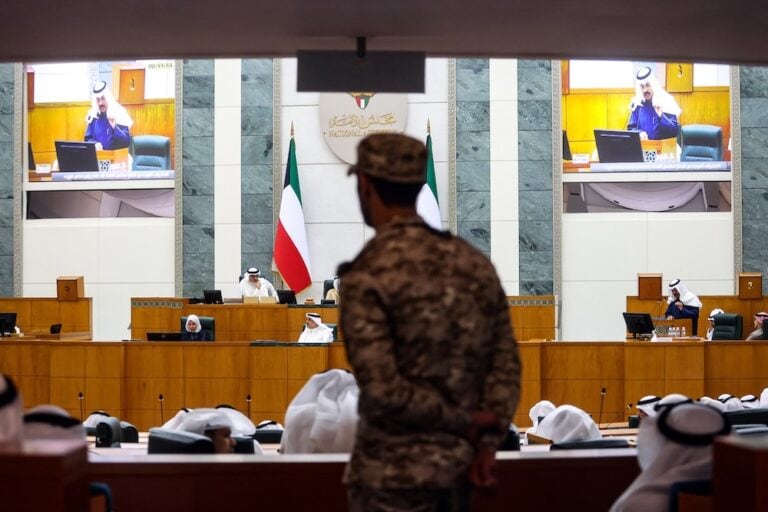(WAN/IFEX) – The following is an excerpt from WAN’s 12 August 2008 APN newsletter: “This new Kuwaiti law means two words: SHUT UP” After months of planning, Kuwait’s Public Prosecutors Office (PPO) is set to finalize a bill that will punish “Internet offenders” in the country. APN (the Arab Press Network, run by the World […]
(WAN/IFEX) – The following is an excerpt from WAN’s 12 August 2008 APN newsletter:
“This new Kuwaiti law means two words: SHUT UP”
After months of planning, Kuwait’s Public Prosecutors Office (PPO) is set to finalize a bill that will punish “Internet offenders” in the country. APN (the Arab Press Network, run by the World Association of Newspapers, WAN, together with the leading Danish press group JP/Politiken) spoke with two Kuwaiti bloggers about the proposed Internet Crime and Data Information law, why it is being implemented and how to get around it.
Article 36 of the Kuwait Constitution guarantees that “every person has the right to express and propagate his opinion verbally, in writing, or otherwise, in accordance with the conditions and procedures specified by law.” Furthermore, Article 37, regarding the freedom of the press, states: “freedom of the press, printing, and publishing is guaranteed in accordance with the conditions and manner specified by law.”
It seems that these constitutional freedoms no longer extend to Kuwait’s large (and still growing) population of bloggers. Prosecutor General Hamed Al-Othman told “Al-Qabas” daily on 27 July that the bill will criminalize the promotion of immoral conduct, encouraging anti-government sentiments, divulging state secrets, or insulting Islam online. Penalties for breaking the law could involve a 1-year prison sentence (7-years if the insulted party is a minor) and monetary fines.
The new Internet law aims to stifle freedom online and has already succeeded in creating self-censorship in the blogging community; the two bloggers who spoke with APN requested to remain anonymous, fearing that providing even the name of their respective blogs could result in reprisal.
Speaking of what this new law means for the future of free expression in Kuwait, one blogger told APN “this law means two words: shut up.” The blogger also noted that most of the Kuwait blogging community is opposing the looming law. “This law is a way to control what bloggers publish online; the government wants to know ‘who is this blogger?’ They want us to shut up so they are free to do anything they want. They can’t handle the truth.”
The blogger provided a list of tips on their website to help other bloggers stay out of trouble when the new Internet law takes effect. Among the tips is “remove the times from comments and leave only dates.” As the blogger explains to APN: “if I put a comment at 2:03:09 a.m., the government can call all ISP’s here in Kuwait and ask for all IP’s running at that time. This is more of a safety tip for the commenter than for the blogger. A scheduled publishing system is a way to protect the blogger. For example, if at 8:00 p.m. I am at the cinema and I have a ticket and at 8:10 p.m. Blogger.com publishes my post, nobody can prove that I published the post.”
Other tips for bloggers include using symbols or codes to refer to taboo public figures rather than their real names and, if questioned, deny even knowing what a blogger is.
A second Kuwaiti blogger, a 31-year old who blogs mainly on political and social matters, believes the new Internet law was created and is so close to implementation because of the government’s fear of the unknown. “They can’t control what bloggers write, unlike the newspapers or TV stations, which are controlled by laws and have financial ties that can’t be cut.”
The blogger explains why the proposed law is unfair simply “because it’s the Internet;” referring to the fact that the Internet should be, by definition, a global communication network, with identical content no matter where in the world you access it. “What is illegal in one country is not illegal in another.”
Prosecutor general Al-Othman reasoned to Al-Qabas daily that the need for a law to control the Internet is obvious to anybody interested in protecting Kuwait’s customs and future generations. “Such a law is needed to combat the increasing electronic crimes associated with the ever-improving electronic technology.”
Nearly one year ago, on 19 August 2007, Kuwaiti blogger Bashar Al-Sayegh was arrested by the Kuwaiti Secret Police due to an anonymous comment posted on his blog that was critical of the Kuwaiti head of state, Sheikh Sabah Al Ahmed Al Jaber Al Sabah. At the same time that Al-sayegh was arrested Jassim Al-Qames, Al Sayegh’s colleague and a photographer for the Al Jarida daily, was detained for photographing the blogger’s arrest. Al-Qames was released after a few hours but Al-Sayegh was held for three days. The anonymous poster of the troublesome comment was arrested when Al-Sayegh was released.
The implementation of a law following the arrest of a blogger in Kuwait is similar to a situation that unfolded in Saudi Arabia early this year. Saudi blogger Ahmad Fouad Al-Farhan was arrested on 10 December 2007 for writing about political prisoners in the kingdom. Al-Farhan had been in prison for 137 days by the time he was released on 26 April 2008. While Al-Farhan was in prison, Saudi Arabia passed a law that would penalize use of the Internet for defamation, violating religious values, and disregarding public etiquette, as well as terrorism, fraud and pornography.


